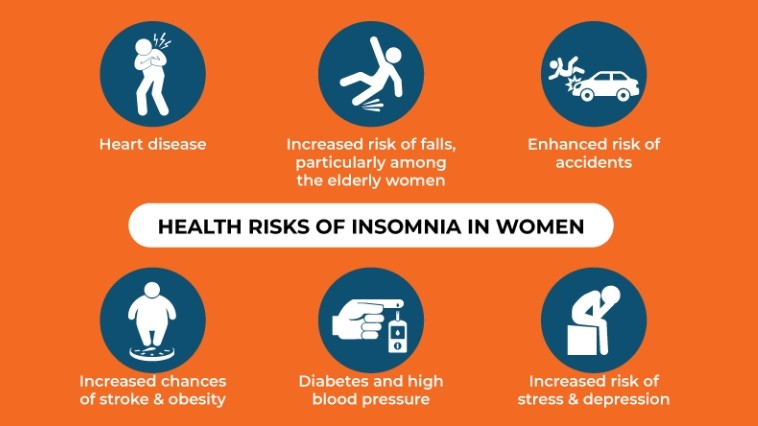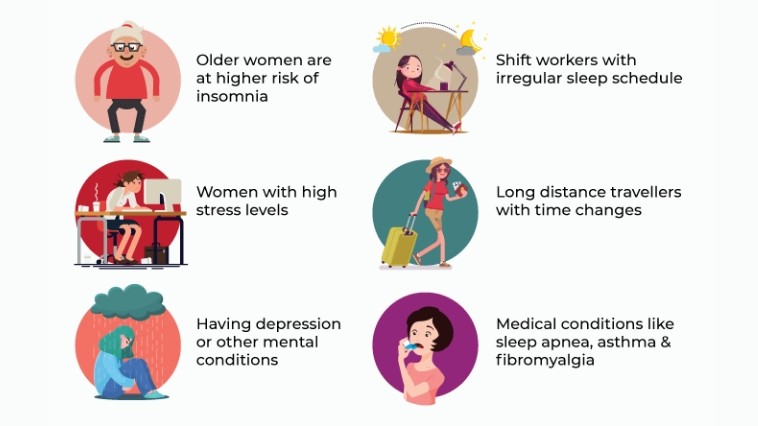- Is falling asleep a challenge for you?
- Do you find trouble staying asleep?
- Do you wake up multiple times during your sleep?
- If you are dealing with the above mentioned problems, then it’s time for you to re-evaluate your sleeping patterns, as you might be suffering from insomnia.
Insomnia is a sleeping disorder which can affect you because of your unhealthy lifestyle. A person is considered to be Insomniac if he finds it difficult to initiate sleep, stay asleep or wake up in the middle of the night without completing the sleep cycle for at least 3 nights a week for 3 months. Lack of sleep can impact overall productivity during the day as one may find it difficult to function normally.
Symptoms of Insomnia
Even though Insomnia is a symptom of an underlying medical condition, there are many signs and symptoms that are associated with insomnia. Some of them are mentioned below:
- Difficulty falling & staying asleep
- Waking earlier than desired
- Tired even after a night’s sleep
- Day time fatigue or sleepiness
- Depression
- Anxiety & irritation
- Poor concentration and focus
- Poor remembrance of events
- Tension
- Headaches
- Difficulty socializing
- Gastrointestinal problems
Types of Insomnia
Insomnia can be categorized into 5 different types:
- Acute Insomnia: Acute insomnia stays for a short period of time because of lack of proper amount of sleep due to life events such as travel, relationships or work. It’s often resolved without treatment.
- Chronic Insomnia: This insomnia is caused due to long-term sleep disturbances i.e. difficulty falling asleep or staying asleep.
- Comorbid Insomnia: Also known as secondary insomnia, this insomnia comes parallelly with other medical or mental health problems.
- Onset Insomnia: In this case the patient finds it difficult to fall asleep.
- Maintenance Insomnia: In this case the patient finds it troublesome to stay asleep
Health Risks of Insomnia in Women
An adult woman needs at least seven to eight hours of sleep every night to stay healthy. Whereas a chronic or long-term insomnia can disrupt the natural balance making it more difficult for women to complete regular tasks, thereby affecting their health. A woman with insomnia is at risk of developing numerous health problems such as:

Why do More Women than Men have Insomnia?
According to a research published in Sleep Research Society, women have a higher genetic risk of developing insomnia than men. In India, women report more cases of insomnia with symptoms such as headache, irritability and fatigue.
Women have unique hormonal changes that can cause insomnia symptoms;
- The Menstrual cycle: Especially in the days leading up to their period when many women report problems going to sleep and staying asleep. This is especially common in women who have premenstrual dysphoric disorder, a more severe type of premenstrual syndrome (PMS).
- Pregnancy: More common during the third trimester, when women tend to wake up more often due to discomfort, leg cramps, or because of the need to use the washroom.
- Perimenopause and Menopause when hot flashes and night sweats can disturb sleep.
Chronic Insomnia
Chronic insomnia can cause clinically significant distress or impairment in important areas of functioning. To be diagnosed with chronic insomnia, you must experience one or more of the following symptoms:
- Difficulty falling asleep
- Staying asleep
- Frequent episodes of waking earlier
- Inability to fall back to sleep
- Feeling tired upon waking
Who are at Risk of Insomnia?

Habits that Ensure a Good Night’s Sleep
Good sleep habits can help prevent insomnia and promote sound sleep:
- Eliminate alcohol and Stimulants like nicotine and caffeine
- Reduce Stress
- Limit activities in bed. Don’t balance the check-book, study, or make phone calls, avoid watching TV or listening to the radio
- Do not eat or drink right before going to bed
- Exercise regularly
- Make your sleeping environment comfortable. Temperature, lighting, and noise should be controlled to make the bedroom conducive.
Treatment of Insomnia
To diagnose insomnia, the specialist will do a complete physical exam and ask you about the daily symptoms, habits, and stress levels.
Your doctor may also:
- Enquire about Your Sleep Habits
Write down the times you go to sleep, wake up, and take naps i.e., maintain a ‘Sleep Diary’. Keep a track of how long you sleep each night and how you feel throughout the day.
- Lab Tests
These might include blood tests to check for thyroid problems or other medical conditions.
- Behavioral Therapy
Changing your sleep habits may help relieve acute insomnia but for patients suffering from chronic or long term insomnia need proper medications and behavioral therapy such as CBT (Cognitive behavioral therapy which is a psychotherapeutic treatment that focuses on educating insomniacs about the thoughts and feelings that influence their behaviour.
- Medicine History
Some medicines, including the ones used to treat heart problems and depression, may cause sleep problems. Consult with your doctor if you need a change in medicines.
- Sleep Study, called a Polysomnogram (PSG)
During a sleep study, you stay overnight at a sleep center or medical facility. You are hooked up to monitors that record brain activity, eye movements, heart rate, and blood pressure while you sleep. Machines also record snoring, chest movements, the amount of oxygen present in your blood, as well as the movement of air through your nose as you breathe.
You can also get a diagnosis from a doctor who specializes in sleep medicine.
The original article can be found here:https://www.medlife.com/blog/insomnia-in-women-causes-symptoms-treatment/


